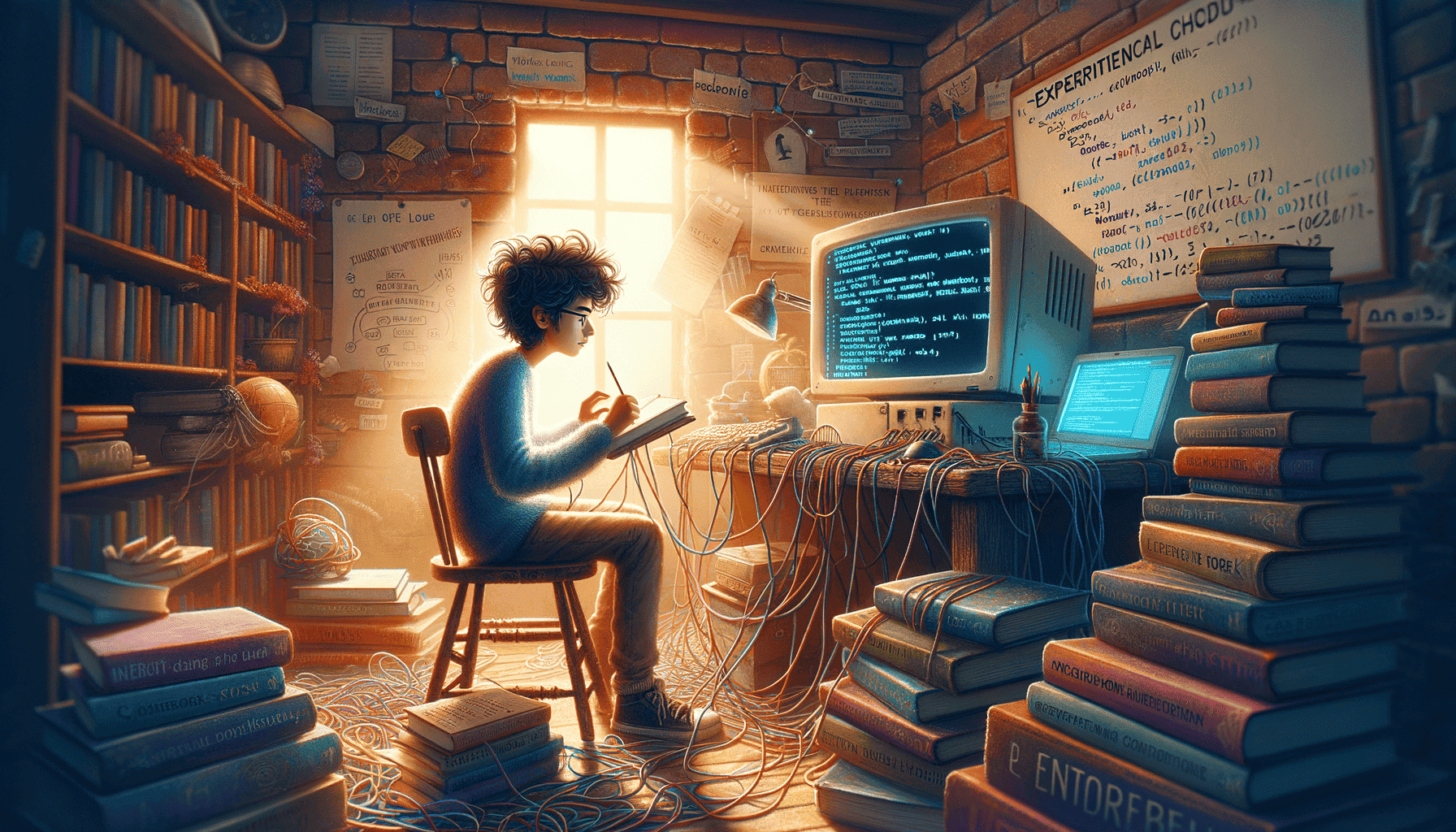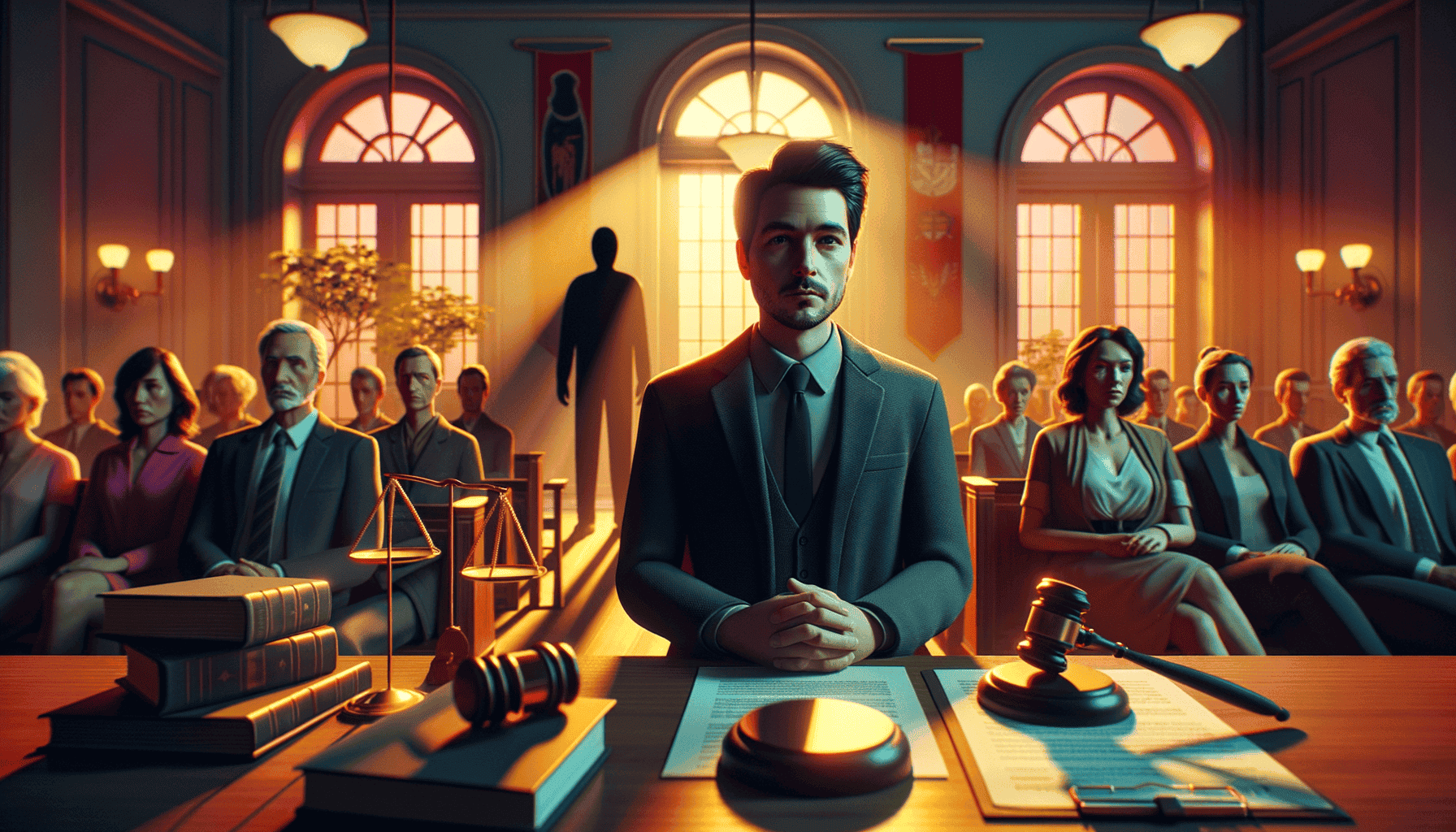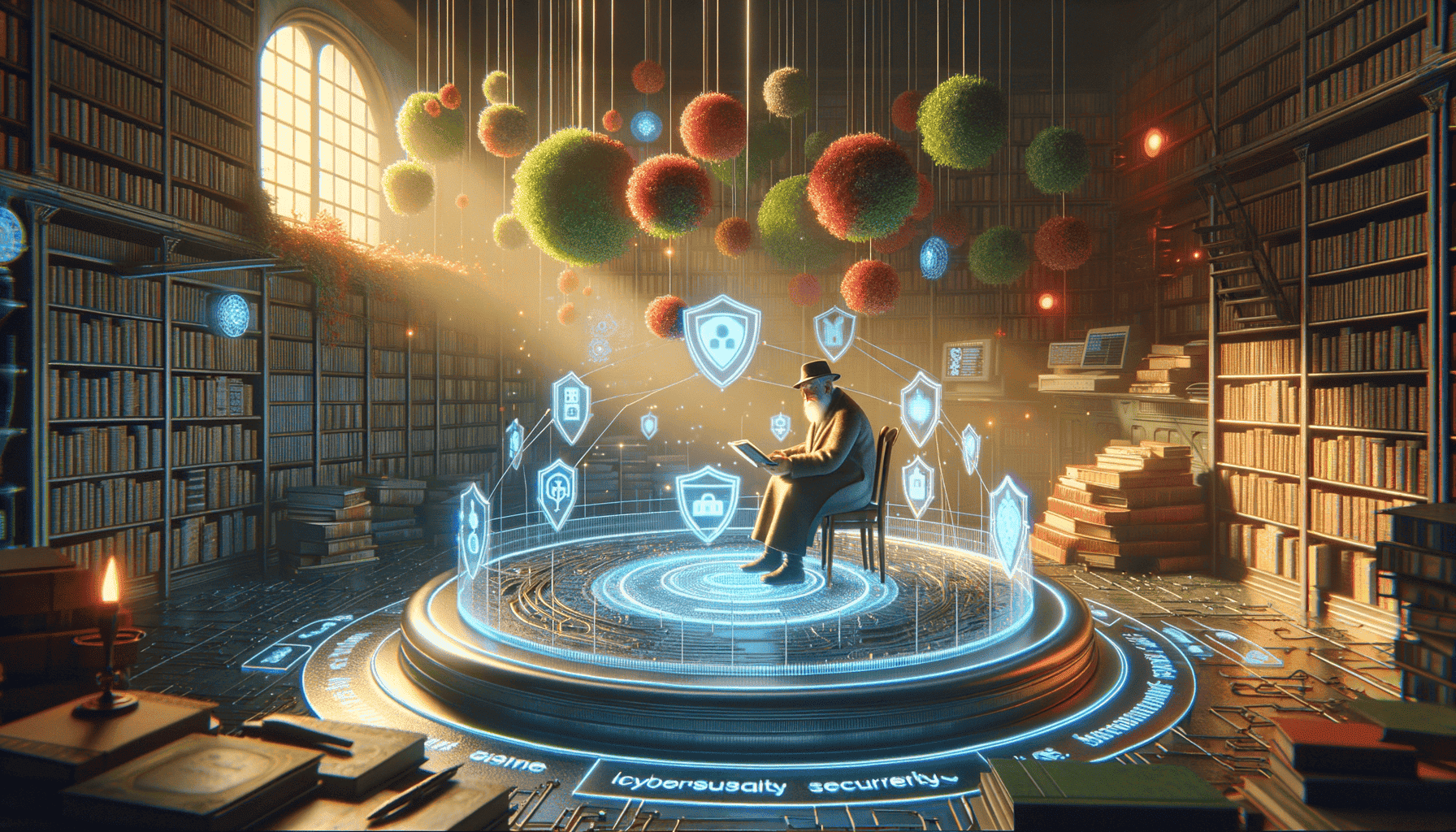The Curious Mind
Robert sat at his computer desk, his fingers tapping softly on the keyboard. The year was 1988, and the internet was like a baby just learning to crawl. ️
"What makes you tick?" Robert whispered to his computer screen. He was a smart young student at Cornell University, where big brains went to learn big things.
The room was quiet except for the gentle hum of his computer. Posters of computer diagrams covered the walls, and books about coding were stacked high on his desk. Robert loved to figure out how things worked, especially computers.
"Hey Robert, still trying to crack the code?" his roommate Jake called from the doorway.
Robert smiled. "The internet is like a huge playground, Jake. But nobody knows how big it really is."
The internet back then wasn't like today's internet. It was more like a bunch of tin cans connected by string, letting computers talk to each other across the country. Robert wanted to count how many computers were connected.
A Bright Mind at Work
Robert was different from other students. While they played games and wrote papers, he spent hours studying how computers talked to each other. His professors noticed his talent.
"You have a gift," Professor Wilson told him one day after class. "But remember, with great power comes great responsibility."
Robert nodded, but his mind was already racing with ideas. He drew diagrams in his notebook:
• Computer A talks to Computer B
• Computer B talks to Computer C
• How many computers are there total?
At night, Robert dreamed about numbers and codes. He imagined tiny messages zooming through wires, bouncing from computer to computer like lightning bugs in a summer sky. ⚡
"I can write a program," he thought one morning. "A program that can count all the computers on the internet!"
His eyes sparkled with excitement as he started typing on his keyboard. The soft click-clack of keys filled the room as Robert began working on what would become one of the most famous computer programs ever made.
Little did Robert know that his curiosity would soon change the internet forever. His simple question about counting computers would lead to something much bigger than he ever imagined.
In his dorm room at Cornell, surrounded by the glow of his computer screen, Robert kept typing. Outside his window, leaves rustled in the autumn breeze, and somewhere in the distance, a bell tower chimed. The internet was about to meet its first worm, and nothing would ever be the same.
The Digital Experiment
Robert’s fingers flew across the keyboard as he worked on his special program. The soft glow of his computer screen lit up his face in the dark dorm room.
“If I make it friendly enough, it can count all the computers without hurting anything,” Robert mumbled to himself. He had been coding for hours, trying to make his program perfect.
It’s like a tiny robot that can copy itself and move from computer to computer through the internet!
His program was special. It could:
• Copy itself to new computers
• Count how many computers it found
• Tell Robert about all the computers it visited
“What are you making now?” asked Jake, bringing Robert a sandwich. Robert hadn’t eaten all day.
“It’s like a tiny explorer,” Robert explained, taking a bite. “It will travel through the internet and count computers for me. Nobody has ever done this before!”
Building the Explorer
Robert wrote his program to be smart. It could find tiny holes in computer security – like finding secret doors between rooms. Through these doors, his program could visit new computers.
“But how will it know where to go?” Jake asked, looking confused at the lines of code on the screen.
“That’s the clever part,” Robert smiled. “It will find its own way, like a curious puppy exploring a new house!”
Testing Time
Late at night, Robert tested his program on a few computers in the lab. Everything seemed to work perfectly. His creation could jump from one computer to another, leaving a tiny counter behind.
“Look!” Robert pointed excitedly at his screen. “It’s already found twenty computers in our building!”
The program was working better than he hoped. It was fast and quiet – nobody would even know it was there. Robert felt proud of his creation, like a parent watching their child take first steps.
The Big Decision
“Maybe I should add one more thing,” Robert thought. He wanted his program to be extra sneaky so it wouldn’t bother anyone while it counted.
He added more code to make the program hide itself better. It could now trick computers into thinking it belonged there, like a chameleon changing colors to blend in.
As the sun began to rise, Robert saved his work one last time. His eyes were tired, but his mind was racing with excitement. Soon he would know exactly how big the internet was!
“Tomorrow,” he yawned, stretching in his chair. “Tomorrow I’ll let it loose, and we’ll see what happens.”
The computer hummed quietly as Robert finally went to bed. His digital explorer was ready for its big adventure, but neither Robert nor anyone else could predict what would happen next. The internet was about to meet something it had never seen before.
Unleashing the Unexpected
The early morning sun peeked through Robert’s dorm room window. His hands trembled slightly as he typed the final command.
“This is it,” Robert whispered. “Time to explore the internet!” With one click, his program started its journey.
November 2, 1988 – The day the first computer worm was released into the internet.
At first, everything seemed fine. Robert watched his screen as the program began counting computers.
“10 computers… 50 computers… 200 computers!” Robert’s eyes grew wide. His program was moving faster than he expected.
Something Strange
Jake burst into the room, looking worried. “Robert! Something weird is happening in the computer lab!”
“What do you mean?” Robert asked, his stomach feeling funny.
“All the computers are super slow. The screens keep flashing weird messages!” Jake explained, waving his hands.
Robert rushed to his keyboard. The numbers were getting bigger and bigger:
• 1,000 computers
• 5,000 computers
• 10,000 computers and climbing!
The First Signs of Trouble
The phone in Robert’s room started ringing. It was his friend from another university.
“Our computers are acting crazy!” his friend shouted. “Everything’s slowing down. What’s happening?”
Robert’s face turned pale. His program wasn’t just counting – it was making too many copies of itself!
The friendly explorer was turning into a computer traffic jam!
Racing Against Time
“I need to stop it!” Robert typed frantically, trying to catch his runaway program. But it was too late – the program had spread too far.
Computer scientists across the country were noticing something strange. Their machines were getting slower and slower.
“Has anyone else’s computer stopped working?” messages appeared on screens everywhere.
“Mine too!”
“What’s going on?”
“Help!”
The Growing Storm
Robert’s tiny explorer had turned into a digital storm. Each copy was making more copies, filling up computers like too many toys in a toy box.
“What have I done?” Robert whispered, watching the chaos unfold on his screen.
News started spreading faster than the program itself. Computer experts were waking up to find their machines stuck. Important research labs couldn’t work. Universities couldn’t send emails.
The internet was getting sick, and Robert’s friendly counting program was the reason why. His simple experiment had turned into something much bigger and scarier than he ever imagined.
As the day went on, more and more computers fell silent. The small program that was supposed to quietly count the internet was now showing everyone just how connected all their computers really were – by breaking those connections one by one.
Digital Chaos
The morning after Robert’s program was released, computers everywhere were sick. It was like a giant traffic jam on the internet highway!
The Big Slowdown
Sally, a computer helper at Berkeley, couldn’t believe her eyes. “All our computers are frozen!” she said into her phone. “Nothing is working!”
Across the country, people were having the same problem:
• NASA couldn't use their computers
• Big universities were stuck
• Even military computers were going slow
• Important scientists couldn't do their work
• Email stopped working
Over 6,000 computers got sick from the worm. That was 1 out of every 10 computers connected to the internet!
Computer Doctors to the Rescue
Computer experts worked day and night to help. They were like doctors trying to make sick computers better.
“We need to find out what’s making them slow!” said Dr. Eugene Spafford at Purdue University. His team worked hard to understand the problem.
Some smart people found out something interesting: Robert’s program was being too friendly! It kept trying to make new friends with every computer it met.
Working Together
“Hey, I think I found something!” shouted Mike, a computer helper at MIT. He started sharing his ideas with other experts.
People from different schools started talking to each other on phones (since email wasn’t working). They shared what they learned:
“The program is copying itself too much!”
“It’s filling up all the computer memory!”
“We need to stop it from making new copies!”
Finding a Cure
Computer helpers had to get creative. Some people unplugged their computers from the internet – like putting a sick person in a quiet room to rest. ️
Teams of smart people worked together to write a special program. They called it a “vaccine” because it helped protect computers from getting sick.
The vaccine helped stop Robert’s program from making more copies. Slowly, computers started feeling better.
Learning Hard Lessons
Tom, a computer teacher, gathered his students. “This shows us why we need to be careful with computer programs,” he explained. “Even friendly programs can cause big problems!”
The problem was getting better, but the internet would never be the same. People realized they needed better ways to keep their computers safe.
Meanwhile, Robert sat in his room, watching the news about his program. He never meant to cause so much trouble. His simple counting game had turned into one of the biggest computer problems ever!
As computers slowly got better, everyone wondered: Who made this program? And what would happen next?
What Happens Now?
The FBI agents walked into Cornell University with serious faces. They were looking for Robert.
The Big Discovery
“We know who did it,” said Agent Johnson, holding a folder of papers. Robert’s friends had noticed he was acting strange and told their teachers.
“I was just trying to count computers,” Robert said quietly. “I didn’t mean to break anything.”
Getting in Trouble
Robert had to go to court. The judge looked at him and said, “This is the first time someone has broken the new computer law.”
Robert could go to jail for up to 5 years and pay a lot of money!
What Did Robert Learn?
Robert felt very sorry. He wrote letters to say:
• He was trying to learn, not hurt anyone
• He wished he had been more careful
• He wanted to help fix what he broke
Making Things Better
The judge decided to be nice. Instead of jail, Robert had to:
✓ Do community service
✓ Pay a fine of $10,000
✓ Help teach others about being safe with computers
Fixing the Internet
Computer experts learned a lot from Robert’s mistake. They started making the internet safer:
They made special teams to protect computers
They wrote better safety rules
They learned how to stop bad programs faster
A Surprise Turn
“Sometimes mistakes help us learn,” said Dr. Smith, a computer teacher. “Robert’s worm showed us how to make computers safer.”
Many people were surprised when MIT later hired Robert as a teacher. They knew he was very smart and had learned from his mistake.
Sarah, a student, raised her hand in class. “What’s different now because of the worm?”
Her teacher smiled and said, “Everything! We now know how important it is to keep computers safe. It’s like putting locks on our digital doors.”
Moving Forward
Robert never made another worm. Instead, he used his smarts to help protect computers. He became someone who fixed problems instead of causing them.
Today, Robert helps make computers and the internet better and safer for everyone!
The story of Robert’s worm changed how we think about computer safety. But there was still one more chapter in this amazing story…
A New Beginning
The sun shone brightly through the windows at MIT, where Robert now worked as a teacher. It was a very different life from his worm days.
Teaching Others
“Welcome to Computer Safety Class!” Robert smiled at his new students. He had come a long way from that young student who made a big mistake.
“Sometimes the best teachers are people who learned from their mistakes,” Robert told his class. “That’s why I’m here today.”
Making the Internet Better
Robert’s worm changed how we use computers forever. Here’s what happened after:
• Special computer safety teams started all over the world
• People made better passwords
• Computers got better protection
• Everyone learned to be more careful online
A Happy Surprise
One day, a visitor came to Robert’s class. It was Agent Johnson, the FBI agent who had arrested him years ago!
“I wanted to see how you’re doing,” Agent Johnson smiled. “You’ve really turned things around.”
Sharing What He Learned
Robert now spends his time:
✓ Teaching students about computers
✓ Helping make the internet safer
✓ Writing books about computer safety
✓ Working with other smart computer people
Looking to the Future
The internet is much safer now because of what we learned from the Morris Worm. Robert helps make sure nothing like that happens again.
Little Billy raised his hand in class. “Mr. Morris, do you regret making the worm?”
“I regret the trouble it caused,” Robert answered honestly. “But I’m glad we learned how to make computers safer because of it.”
The Big Picture
Today, computers are everywhere – in our phones, cars, and homes. Thanks to what we learned from the Morris Worm, we know how to keep them safer.
Even small actions can have big effects. It’s important to think carefully before we do things with computers.
Robert’s story shows us that mistakes don’t have to be the end. They can be the beginning of something better. His worm might have caused problems, but it also helped make our digital world safer for everyone.
Now, when Robert looks at computers, he doesn’t see ways to cause trouble. He sees ways to help people and make the internet better for everyone. And that’s the best ending anyone could hope for.






